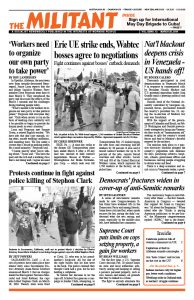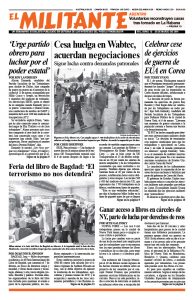BEAUREGARD, Ala. — “People came out of nowhere to help us. It was amazing, people kept stopping by to lend a hand,” John Askew told Socialist Workers Party members lending solidarity here March 8. He was clearing the debris left by fallen trees in front of his mother-in-law’s damaged trailer.
This rural town of 10,000 in Lee County was hardest-hit by a powerful tornado March 3 packing 170 mph winds that cut a deadly swathe up to a mile wide for over 20 miles. Twenty-three people were killed, ranging from 6 to 89 years old, both Caucasian and Black. Some 90 were injured.
Askew, a 41-year-old power line worker, said some of his relatives were among those who were killed. “We have several funerals to attend. We’re grateful that donations have come in to pay for all 23 of the funerals,” he said.
His family is waiting to hear from the Federal Emergency Management Agency to see if they will get any assistance.
There was no way working people there could have been prepared. Beauregard has only one storm shelter, at the Providence Baptist Church. “They need to build more community storm shelters. More lives could have been saved,” said hotel worker Judy King from nearby Opelika. Several others echoed this, saying the government had done nothing to organize transportation to help the elderly or others get to the shelter.
Some who took shelter in their bathrooms thinking they were safe didn’t survive, as they were sucked out of their home or their entire house was hurled off its foundations.
The government “failed miserably during [Hurricane] Katrina,” 55-year-old Marriott Hotel engineer Rick Murphy told us as President Donald Trump toured the area by helicopter, promising FEMA would give Alabama “the A Plus treatment.” This time, Murphy said, he hopes “they do better and it’s not just talking and nothing else happens.”
Chequeta Davis, who works at the Kia auto plant in West Point, Georgia, and her young daughter were among those we met bringing donations. “It takes people like us to make a difference,” Davis said.
Forecasters had warned of impending tornadoes days before. But as the severe weather approached, some residents had already lost access to phones, TV or social media. Sirens were sounded giving people about 10 minutes to prepare, if they heard them, but it was already too late to get to the shelter.
The cause of the deaths and calamity here wasn’t nature. It was the workings of the dog-eat-dog for-profit capitalist system. It was a social, not a weather catastrophe.
Much of the destruction is a product of the poor infrastructure in this rural area. There are few structures robust enough to withstand gale-force winds. The big percentage of mobile and other weak-framed homes are extremely vulnerable. In rural Alabama, nearly 16 percent of households are factory-produced mobile homes, a source of profit for the manufacturers, as most people here can’t afford stronger site-built homes.
“There is no reason for people to die in their home during a tornado,” Timothy Marshall, an engineer and meteorologist, told the press. He pointed out that even mobile homes can be equipped with simple, safe porch shelters. But individual shelters are expensive and even the best grant from FEMA, if someone is able to navigate their bureaucracy, doesn’t cover the whole price.
Dave Ferguson contributed to this article.

